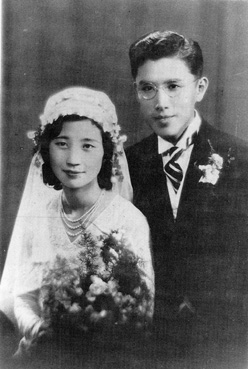Zhou Peiyuan
| The below content is licensed according to Creative Commons Attribution-ShareAlike License contrary to the public domain logo at the foot of the page. It originally appeared on http://en.wikipedia.org. The original article might still be accessible here. You may be able to find a list of the article's previous contributors on the talk page. |
Zhou Peiyuan (周培源 - Chou P'ei-yüan; August 28, 1902 – November 24, 1993) was a Chinese theoretical physicist and politician. He served as president of Peking University, and was an academician of the Chinese Academy of Sciences (CAS).[1]
Born in Yixing, Jiangsu, China, Zhou graduated from Tsinghua University in 1924. Then he went to the United States and obtained a bachelor's degree from University of Chicago in spring of 1926, and a master's degree at the end of the same year. In 1928, he obtained his doctorate degree from California Institute of Technology under Eric Temple Bell with thesis The Gravitational Field of a Body with Rotational Symmetry in Einstein's Theory of Gravitation.[2] In 1936, he studied general relativity under Albert Einstein in the Institute for Advanced Study in Princeton, New Jersey.[1] He did his post-doc researches in quantum mechanics at University of Leipzig in Germany and Swiss Federal Institute of Technology Zurich. He was a professor of physics at Peking University, and later served as the president of the University. He was elected as a founding member of CAS in 1955.
Tsinghua University's Zhou Pei-Yuan Center for Applied Mathematics is named in his honor.[3] In 2003, a bronze statue of Zhou was unveiled on the campus of Peking University.
Zhou's most famous work is the transport equation of Reynolds stress.[4]
References
- ↑ 1.0 1.1 "Zhou Peiyuan Is Dead – Educator-Scientist, 91". NY Times. 25 November 1993. https://www.nytimes.com/1993/11/25/obituaries/zhou-peiyuan-is-dead-educator-scientist-91.html.
- ↑ Template:MathGenealogy
- ↑ Pei-Yuan Center for Applied Mathematics, Tsinghua University 25, 2015/https://web.archive.org/web/20150925095953/http://www.tsinghua.edu.cn/publish/zhpyen/1183/Zhou Archived September 25, 2015, at the Wayback Machine.
- ↑ P. Y. Chou (1945). "On velocity correlations and the solutions of the equations of turbulent fluctuation". Quart. Appl. Math. 3: 38–54. doi:10.1090/qam/11999.
<ref> tag with name "BeijingConfidential" defined in <references> is not used in prior text.- 1902 births
- 1993 deaths
- California Institute of Technology alumni
- Educators from Wuxi
- Members of the Chinese Academy of Sciences
- Members of the Jiusan Society
- Academic staff of Peking University
- People from Yixing
- Physicists from Jiangsu
- Presidents of Peking University
- Scientists from Wuxi
- Academic staff of Tsinghua University
- University of Chicago alumni
- Vice Chairpersons of the National Committee of the Chinese People's Political Consultative Conference
